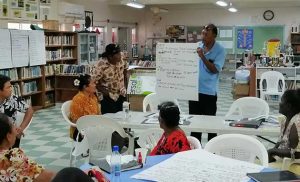Bolstering Food Security in Marshall Islands
 17 Agustus 2021
17 Agustus 2021

By External Source
MAJURO, Marshall Islands, Aug 16 2021 (IPS-Partners)
Forty schoolteachers and principals in the Republic of Marshall Islands (RMI) completed a five-day workshop last month equipping schools to play a key role in strengthening the food security efforts in the country.
The participants of this workshop, who are part of the Public-School System (PSS) in RMI, covered key topics on agriculture science, nutrition and integrating social and governance dimension to agriculture in schools.
The workshop was supported by the Pacific Community (SPC) through funding partnership from USAID and the generous support of the American people under the North Pacific Food Security Governance project. It was facilitated in partnership with the Center for Getting Things Started (C4GTS) and the RMI PSS.
During the official opening, Assistant Commissioner for Secondary Schools, Junior Paul stressed the importance of the School Learning Garden and the support rendered to advance the work in this area.
A major focus of the workshop was on agriculture and food security in the context of rights and responsibilities to ensure the active participation of students in decision-making.
This approach builds a strong relationship between adults and young people when it comes to decision-making about the school garden and promotes social citizenry – an important life skill.
Lead trainer, Koh Ming Wei, who facilitated the training from Hawaii said, “it was very meaningful to be able to incorporate rights and responsibilities when addressing decision-making in the Agriculture Curriculum. One of the standards connected to the right to food and the right to grow food, ensures that food is accessible to all, including vulnerable groups in the communities,” Ming Wei added.
The RMI PSS is committed to food security by having school gardens and farms in all the high school campuses and at least 25 of the elementary schools, where students got the opportunity to grow food for the cafeteria. PSS also focuses on the curricular to enable students to learn about agriculture – what they grow and nutritional facts – what they eat.
One of the results of the workshop was the identification of benchmarks and learning outcomes for agriculture science units.
Marshall Island High School Teacher Nancy Soriano stated that “linking human rights to our cultural values should be taught in schools and integrating it in the Agriculture Curriculum will help raise awareness in protecting our land and traditional agricultural practices.”
Ministry of Natural Resources and Conservation, Assistant Chief, Randon Jack and Agroforestry Director, Lakjit Rufus also shared similar sentiments and highlighted that linking human rights to cultural values and using it in traditional agricultural practices added tremendous value to the workshop outcomes. It also enables the school curriculum to align with national frameworks.
Rose Martin, North Pacific Food Security Governance Project Manager further noted that “building such life skills with young people and enhancing the role of the school in food security is a right step towards having a resilient and food secure country.”
About the North Pacific Food Security Governance Project
The North Pacific Food Security Governance Project is made possible by the generous support of the American people through the USAID. The goal of Project is to support FSM, Palau and RMI, to address food security in the context of COVID-19. In this regard, the North Pacific Food Security Governance Project focuses on mainstreaming a people-centred approach to addressing food security in the context of COVID-19 in FSM, Palau and RMI; and implementing selected activities to support governance at various local levels, to ensure food security management and COVID-19 response mechanisms are people-centred, i.e. they are gender responsive, socially inclusive, environmentally sustainable, and respect and protect human rights.
Media contacts:
Kalpana Nizarat, Communications Officer, Human Rights and Social Development (HRSD) division, SPC | [email protected]
